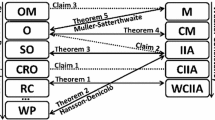Abstract
This article provides a systematic analysis of social choice theory without the Pareto principle, by revisiting the method of Murakami Yasusuke. This article consists of two parts. The first part investigates the relationship between rationality of social preference and the axioms that make a collective choice rule either Paretian or anti-Paretian. In the second part, the results in the first part are applied to obtain impossibility results under various rationality requirements of social preference, such as S-consistency, quasi-transitivity, semi-transitivity, the interval-order property, and acyclicity.
Similar content being viewed by others
References
Arrow KJ (1951) Social choice and individual values, 1st edn. Wiley, New York
Arrow KJ (1963) Social choice and individual values, 2nd edn. Wiley, New York
Banks JS (1995) Acyclic social choice from finite sets. Soc Choice Welf 12: 293–310
Binmore K (1976) Social choice and parties. Rev Econ Stud 43: 459–464
Blair DH, Bordes G, Kelly JS, Suzumura K (1976) Impossibility theorems without collective rationality. J Econ Theory 13: 361–379
Blair DH, Pollak RA (1979) Collective rationality and dictatorship: the scope of the arrow theorem. J Econ Theory 21: 186–194
Blair DH, Pollak RA (1982) Acyclic collective choice rules. Econometrica 50: 931–943
Blau JH (1979) Semiorders and collective choice. J Econ Theory 21: 195–206
Border KC (1983) Social welfare functions for economic environments with and without the Pareto principle. J Econ Theory 29: 205–216
Bossert W, Suzumura K (2008) A characterization of consistent collective choice rules. J Econ Theory 138: 311–320
Bossert W, Suzumura K (2009) Decisive coallitions and coherence properties. Discussion Paper, Université de Montréal—CIREQ
Brown DJ (1975) Aggregation of preferences. Quart J Econ 89: 456–469
Campbell DE (1989) Wilson’s theorem for economic environments and continuous social preferences. Soc Choice Welf 6: 315–323
Campbell DE (1990) Intergenerational social choice without the Pareto principle. J Econ Theory 50: 414–423
Campbell DE, Kelly JS (1993) t or 1−t. that is the trade-off. Econometrica 61: 1355–1365
Campbell DE, Kelly JS (1998) Quasitransitive social preference: why some very large coalitions have very little power. Econ Theory 12: 147–162
Campbell DE, Kelly JS (2002) Impossibility theorems in the Arrovian framework. In: Arrow KJ, Sen AK, Suzumura K (eds) Handbook of social choice and welfare vol 1. North-Holland, Amsterdam, pp 35–94
Campbell DE, Kelly JS (2003) On the Arrow and Wilson impossibility theorems. Soc Choice Welf 20: 273–281
Cato S (2011) Remarks on Suzumura consistent collective choice rules, Working Paper University of Tokyo
Cato S (2010) Brief proofs of Arrovian impossibility theorems. Soc Choice Welf 35: 267–284
Cato S, Hirata D (2010) Collective choice rules and collective rationality: a unified method of characterizations. Soc Choice Welf 34: 611–630
Fountain J, Suzumura K (1982) Collective choice rules without the Pareto principle. Int Econ Rev 23: 299–308
Gibbard A (1969) Social choice and the Arrow condition. Working paper Harvard University
Guha A (1972) Neutrality, monotonicity, and the right of veto. Econometrica 40: 821–826
Hansson B (1976) The existence of group preference functions. Public Choice 28: 89–98
Kelsey D (1984) Acyclic choice without the Pareto principle. Rev Econ Stud 51: 693–699
Kelsey D (1985) The liberal paradox: a generalisation. Soc Choice Welf 1: 245–250
Kelsey D (1988) What is responsible for the “Paretian epidemic”?. Soc Choice Welf 5: 303–306
Kirman AP, Sondermann D (1972) Arrow’s theorem, many agents, and invisible dictators. J Econ Theory 5: 267–277
Mas-Colell A, Sonnenschein H (1972) General possibility theorems for group decisions. Rev Econ Stud 39: 185–192
Malawski M, Zhou L (1994) A note on social choice theory without the Pareto principle. Soc Choice Welf 11: 103–107
Miller MK (2009) Social choice theory without Pareto: the pivotal voter approach. Math Soc Sci 58: 251–255
Murakami Y (1968) Logic and social choice, Routledge London
Monjardet B (1983) On the use of ultrafilters in social choice theory. In: Pattanaik PK, Salles M (eds) Social Choice and Welfare, Amsterdam, pp 73–78
Nagahisa R (1991) Acyclic and continuous social choice in T 1 connected spaces. Soc Choice Welf 8: 319–332
Nakamura K (1979) The vetoers in a simple game with ordinal preferences. Int J Game Theory 8: 55–61
Plott CR (1973) Path independence, rationality, and social choice. Econometrica 41: 1075–1091
Sen AK (1970) Collective choice and social welfare. Holden-Day, San Francisco
Sen AK (1976) Liberty, unanimity and rights. Economica 43: 217–245
Sen AK (1979) Personal utilities and public judgements: or what’s wrong with welfare economics? Econ J 89: 537–558
Sen AK (1995) Rationality and social choice. Am Econ Rev 85: 1–24
Suzumura K (1976) Remarks on the theory of collective choice. Economica 43: 381–390
Ubeda L (2003) Neutrality in arrow and other impossibility theorems. Econ Theory 23: 195–204
Wilson R (1972) Social choice theory without the Pareto principle. J Econ Theory 5: 478–486
Xu Y (1990) The Libertarian paradox: some further observations. Soc Choice Welf 7: 343–351
Author information
Authors and Affiliations
Corresponding author
Rights and permissions
About this article
Cite this article
Cato, S. Social choice without the Pareto principle: a comprehensive analysis. Soc Choice Welf 39, 869–889 (2012). https://doi.org/10.1007/s00355-011-0564-z
Received:
Accepted:
Published:
Issue Date:
DOI: https://doi.org/10.1007/s00355-011-0564-z



